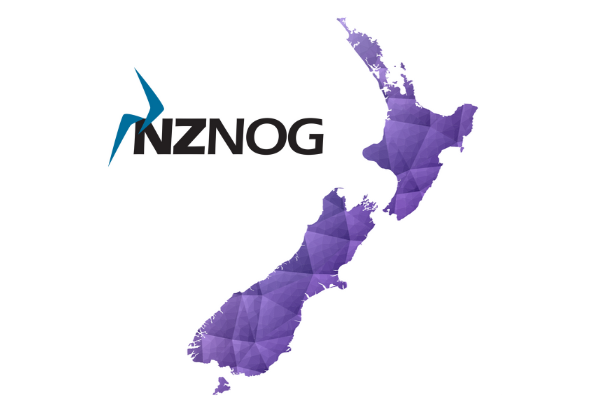Categories
NZIX was a proud Gold Sponsor of this year’s NZNOG, which took place in Rotorua late March. The NZIX team hosted a stand and were a valued contributor towards making the event a resounding success.
In the conference itself, NZIX committee member Simon Allard, in his capacity as Head of Technology Architecture at 2degrees, gave a fascinating talk about the impacts and learnings from Cyclone Gaby for both Vocus and 2degrees . Rene, from FLEXOPTIX, gave both a terrifying, yet heart-warming talk on the Keep Ukraine Connected project.
IAA also sent our very own Matt Kobayashi who gave a bit of an update on ‘all things tech’ on NZIX’s three exchanges and an informative lightning talk about optical circulators and how they can be used when bi-directional (BiDi) optical transceivers are not available. Watch it now on the NZNOG YouTube channel.
The national 2023-24 Budget was released earlier this month, which will no doubt affect the telco sector in the year ahead. Here are some key details from this year’s budget:
- $86.5 million to establish a National Anti-Scam Centre, boost ASIC’s work, and establish a SMS Sender ID Registry
- $44.3 million to the OAIC to take appropriate regulatory action and enhance its data and analytics capability, and support a standalone Privacy Commissioner
- $0.9 million over 2 years to progress the review of the Privacy Act
- $26.9 million to expand Digital ID
- $23.4 million over 3 years to support small businesses to build resilience to cyber threats
- $19.5 million to support responsible entities owning critical infrastructure to respond to significant cyber threats
- $46.5 million over 4 years to establish the Coordinator for Cyber Security to enhance the Commonwealth’s cyber security efforts
- $134.1 million over 4 years to fund the eSafety Commissioner – quadrupling its base operational funding
- $10.1 million over 2 years to establish a central task force for the delivery of a new Public Safety Mobile Broadband capability – an initiative that will provide Public Safety Agencies and first responders with fast and secure voice, video and data communications
- $50 million for the Telecommunications Disaster Resilience Innovation grant program
- $15 million for the next round of the Mobile Network Hardening Program
It’s clear that cyber security and online safety are core focuses for the government, with a particularly significant increase in investment towards eSafety. This is likely to have a great impact on the telco sector as we have already seen a wide number of legislative reforms in relation to the SOCI Act, Privacy Act, and the TIA Act, as well as the ongoing development of Industry Codes for online safety.
Although IAA welcomes the government’s commitment to safety online, including cyber security, we emphasise that this be actioned in a measured and effective manner, with genuine engagement with industry and other stakeholders throughout all legislative and regulatory reform processes.
We’re delighted to announce that we have been awarded Great Place to Work® Certification. We now feature on the Great Place to Work portal, where you can learn more. We will wear this new badge with pride as a sign of a positive employee experience. In receiving this accreditation, we join the ranks of Cisco, Google and American Express. Great Place to Work is a globally recognised employee validation program.
On our first attempt at achieving certification, we received an impressive 86% overall satisfaction score. This score is based on a comprehensive employee survey and a detailed questionnaire about our workplace. Because employee feedback and independent analysis determine the scores, our certification can give future employees confidence that we genuinely offer a great company culture.
Hiring and retaining talent has never been more important or more challenging for all employers, so earning this certification means a lot to us. We aim to be an employer of choice and foster a healthy workplace culture.
Undergoing the Great Place to Work assessment gave us some real insights into what we’re doing well and some opportunities to improve.
Comments from team members included:
“Excellent flexibility working from home, and ample opportunity to attend to outside of work commitments and requirements and make up the work later when it suits.”
“As a relatively small team, everyone is very busy but still happy to help each other out. We have lots of opportunities to grow in the industry, such as participating in industry forums and conferences.”
“Genuine flexibility and care from the management. Know how and understanding of the Internet and industry. Our status and respect as a trusted player in the industry.”
Of course, we are always looking ways we can be even better and look forward to repeating the process annually so that we can keep track of our progress. In this way, you can always be confident that creating a safe and happy workplace is at the heart of everything we do.
If you or someone you know are looking for a progressive and proactive place to work, check out our latest career opportunities on our website.
Our success in achieving Great Place to Work Certification is all thanks to our awesome team. Each and every one of them has contributed to making this possible and we’re pleased to share their achievement with you.
Since our last newsletter, we have been very busy hosting and planning Convergent Events for our Members to network, learn and grow.
First up in March was an online event – “Malicious Domains: Where they are, and what we can do about them.” Industry experts, Graeme Bunton and Rowena Schoo, of the DNS Abuse Institute gave us fascinating insights into this topic. Don’t worry if you missed it, you can find it on IAA’s YouTube channel.
This was soon followed by an in-person event in Adelaide, in partnership with APNIC Academy Training, who provided an insightful RPKI/ROV Tutorial. This gave our members the opportunity to receive free training on this important subject (typically valued at $80), followed by the opportunity to network at our social event.
For those who couldn’t make Adelaide, you’ll be pleased to learn we’re partnering with APNIC Academy Training to provide the RPKI/ROV Tutorial again in two other locations. More details to follow, but make a note in your calendar, if you’ll be in Canberra, Tuesday 18 July 2023 or Sydney, Thursday 20 July 2023. In both cities the tutorial will run 1.30pm – 5.30pm AEST and be followed by a social event. Check your emails and the IAA Portal closer to the date to register.
In other news, our Melbourne Convergent Event in May featured a talk by Professor Darryl Veitch entitled “Can I trust my clock? Why NTP is fail .” The presentation was followed by drinks and nibbles. Darryl’s presentation was well received with one attendee reporting: “Everything I thought I knew about how NTP worked and synced and reliability was wrong. This may have been one of those red pill or blue pill moments.”
Register now for our Convergent Online Event 1 June
On the back of the success of this event, we have decided to share Professor Veitch’s insights with the rest of our Members, with a special online event on Thursday 1 June 2023 from 12pm AEST (10am AWST) via Zoom.
Register via the IAA Portal now!
Member registration Non-member registration
We look forward to bringing you even more Convergent Conference Events soon.
The policy team continues to work hard to represent members in important legislative and regulatory reform processes that is sure to impact the Internet industry. Please get in touch to share any thoughts on any open and previous submissions; we always appreciate your feedback.
Completed Submissions
2023-2030 Australian Cyber Security Strategy | Department of Home Affairs
The Department of Home Affairs and the Strategy Expert Advisory Board sought feedback on the 2023-30 Australian Cyber Security Strategy Discussion Paper. Our response primarily focused on the need for greater genuine engagement and collaboration to ensure a truly effective approach to cyber security. In the context of increasing regulatory requirements for the telco sector in relation to data security, critical infrastructure and privacy, we emphasised the need to harmonise and simplify the current policy landscape for an effective and efficient strategy that combats the threats and risks to Australia’s cyber security.
Final Access Determination (SBAS) | ACCC
The ACCC released its Exposure Draft to the Superfast Broadband Access Service Final Access Determination. This draft instrument was based on the ACCC’s decision released in October 2022, with limited incorporation of stakeholder feedback to the consultation held during December 2022. Our response reiterated our positions stated in our response during the December consultation, including the extension of the Determination to cover all residential TC-4 speed tiers at NBN Co pricing, and regarding NNI and state based aggregation charges. We also recommended the Determination to expressly set out prohibition to on-charge RBS.
Open Submissions
Draft Decision: Variation to the NBN Co Special Access Undertaking (Nov 2022) | ACCC | 30 May 2023
The ACCC has released its draft decision to reject the proposed NBN Co SAU Variation. It is seeking views on its draft decision, and whether providers would accept a NBN Co SAU variation proposal based on NBN Co’s letter in response to the issues raised by the ACCC.
Although rejecting the SAU overall, amongst other things, the ACCC has indicated it is willing to accept the price increase for the 50/20 Mbps speed tier.
If you would like to review and respond to the ACC’s draft decision, submissions close on 30 May 2023.
Someone outlined the plot of an action film to me recently. Picture this, a worldwide communications system, built on a fundamentally flawed numbering system, is being held to ransom by unscrupulous operators. These operators won’t abide by the rules and use every means at their disposal to prevent the rules from being imposed on them, including bribery, corruption, hacking, DOS attacks, death threats, vexatious litigation and international subterfuge, crippling the administration of the communications governance system in a major continent. Sound like a fun film? An outlandish story? I fear it will be playing soon at a local conference centre near you, as these are all allegations that have been made against some people contesting the APNIC Executive Council elections. Sadly, however, with the price of IPv4 addresses getting higher and higher, we are likely to see increased shenanigans, so it is all the more important that we ensure the governance of our regional internet registries are sound. The term ‘Wild West’ has often been used to describe internet actors, but in reality the policy processes of our Internet governance systems including ICANN, APNIC and the IETF are usually much more boring and very disciplined. Let’s keep it that way. If you have a vote in the APNIC EC election, make sure you vote and use your vote wisely.
Speaking of things to combat the ‘Wild West’, we’ve announced our new online and in person conference series, kicking off with a session on Malicious Domains, given by Graeme Bunton and Rowena Schoo of the DNS Abuse Institute. This fun session will overview the latest research into DNS abuse, covering mitigations and best practice to keep things relating to our domain name system as boring and behind the scenes (i.e. WORKING!) as possible. I hope to see you online.
This month I will be heading off to Apricot in the Philippines, where I will catch up with our colleagues from other IXPs across the region and hear about new content and other services likely to appear on our networks soon. A check of our traffic statistics tells us we are serving over a petabyte in content each day! Rest assured I will be hunting more of it down wherever I can. If there is a game or other service your users are driving up the transit bills with, let me know and we will do what we can to get them into our content farm.
In other news, I hope you enjoy our latest article on traffic engineering, celebrate SA-IX’s birthday, check your Amazon IPv6 peering for a little typo recently discovered, and invite your colleagues to apply for this year’s IAA Systers program!





